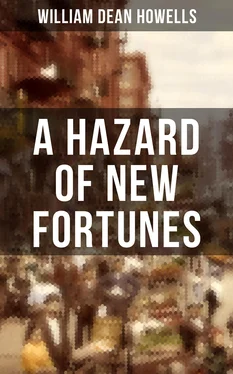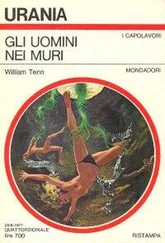"Yes, yes," said Fulkerson. "Well, the natural-gas country is worth seeing. I don't mean the Pittsburg gas-fields, but out in Northern Ohio and Indiana around Moffitt—that's the place in the heart of the gas region that they've been booming so. Yes, you ought to see that country. If you haven't been West for a good many years, you haven't got any idea how old the country looks. You remember how the fields used to be all full of stumps?"
"I should think so."
"Well, you won't see any stumps now. All that country out around Moffitt is just as smooth as a checker-board, and looks as old as England. You know how we used to burn the stumps out; and then somebody invented a stump-extractor, and we pulled them out with a yoke of oxen. Now they just touch 'em off with a little dynamite, and they've got a cellar dug and filled up with kindling ready for housekeeping whenever you want it. Only they haven't got any use for kindling in that country—all gas. I rode along on the cars through those level black fields at corn-planting time, and every once in a while I'd come to a place with a piece of ragged old stove-pipe stickin' up out of the ground, and blazing away like forty, and a fellow ploughing all round it and not minding it any more than if it was spring violets. Horses didn't notice it, either. Well, they've always known about the gas out there; they say there are places in the woods where it's been burning ever since the country was settled.
"But when you come in sight of Moffitt—my, oh, my! Well, you come in smell of it about as soon. That gas out there ain't odorless, like the Pittsburg gas, and so it's perfectly safe; but the smell isn't bad—about as bad as the finest kind of benzine. Well, the first thing that strikes you when you come to Moffitt is the notion that there has been a good warm, growing rain, and the town's come up overnight. That's in the suburbs, the annexes, and additions. But it ain't shabby—no shanty-farm business; nice brick and frame houses, some of 'em Queen Anne style, and all of 'em looking as if they had come to stay. And when you drive up from the depot you think everybody's moving. Everything seems to be piled into the street; old houses made over, and new ones going up everywhere. You know the kind of street Main Street always used to be in our section—half plank-road and turnpike, and the rest mud-hole, and a lot of stores and doggeries strung along with false fronts a story higher than the back, and here and there a decent building with the gable end to the public; and a court-house and jail and two taverns and three or four churches. Well, they're all there in Moffitt yet, but architecture has struck it hard, and they've got a lot of new buildings that needn't be ashamed of themselves anywhere; the new court-house is as big as St. Peter's, and the Grand Opera-house is in the highest style of the art. You can't buy a lot on that street for much less than you can buy a lot in New York—or you couldn't when the boom was on; I saw the place just when the boom was in its prime. I went out there to work the newspapers in the syndicate business, and I got one of their men to write me a real bright, snappy account of the gas; and they just took me in their arms and showed me everything. Well, it was wonderful, and it was beautiful, too! To see a whole community stirred up like that was—just like a big boy, all hope and high spirits, and no discount on the remotest future; nothing but perpetual boom to the end of time—I tell you it warmed your blood. Why, there were some things about it that made you think what a nice kind of world this would be if people ever took hold together, instead of each fellow fighting it out on his own hook, and devil take the hindmost. They made up their minds at Moffitt that if they wanted their town to grow they'd got to keep their gas public property. So they extended their corporation line so as to take in pretty much the whole gas region round there; and then the city took possession of every well that was put down, and held it for the common good. Anybody that's a mind to come to Moffitt and start any kind of manufacture can have all the gas he wants free; and for fifteen dollars a year you can have all the gas you want to heat and light your private house. The people hold on to it for themselves, and, as I say, it's a grand sight to see a whole community hanging together and working for the good of all, instead of splitting up into as many different cut-throats as there are able-bodied citizens. See that fellow?" Fulkerson broke off, and indicated with a twirl of his head a short, dark, foreign-looking man going out of the door. "They say that fellow's a Socialist. I think it's a shame they're allowed to come here. If they don't like the way we manage our affairs let 'em stay at home," Fulkerson continued. "They do a lot of mischief, shooting off their mouths round here. I believe in free speech and all that; but I'd like to see these fellows shut up in jail and left to jaw one another to death. We don't want any of their poison."
March did not notice the vanishing Socialist. He was watching, with a teasing sense of familiarity, a tall, shabbily dressed, elderly man, who had just come in. He had the aquiline profile uncommon among Germans, and yet March recognized him at once as German. His long, soft beard and mustache had once been fair, and they kept some tone of their yellow in the gray to which they had turned. His eyes were full, and his lips and chin shaped the beard to the noble outline which shows in the beards the Italian masters liked to paint for their Last Suppers. His carriage was erect and soldierly, and March presently saw that he had lost his left hand. He took his place at a table where the overworked waiter found time to cut up his meat and put everything in easy reach of his right hand.
"Well," Fulkerson resumed, "they took me round everywhere in Moffitt, and showed me their big wells—lit 'em up for a private view, and let me hear them purr with the soft accents of a mass-meeting of locomotives. Why, when they let one of these wells loose in a meadow that they'd piped it into temporarily, it drove the flame away forty feet from the mouth of the pipe and blew it over half an acre of ground. They say when they let one of their big wells burn away all winter before they had learned how to control it, that well kept up a little summer all around it; the grass stayed green, and the flowers bloomed all through the winter. I don't know whether it's so or not. But I can believe anything of natural gas. My! but it was beautiful when they turned on the full force of that well and shot a roman candle into the gas—that's the way they light it—and a plume of fire about twenty feet wide and seventy-five feet high, all red and yellow and violet, jumped into the sky, and that big roar shook the ground under your feet! You felt like saying:
"'Don't trouble yourself; I'm perfectly convinced. I believe in Moffitt.' We-e-e-ll!" drawled Fulkerson, with a long breath, "that's where I met old Dryfoos."
"Oh yes!—Dryfoos," said March. He observed that the waiter had brought the old one-handed German a towering glass of beer.
"Yes," Fulkerson laughed. "We've got round to Dryfoos again. I thought I could cut a long story short, but I seem to be cutting a short story long. If you're not in a hurry, though—"
"Not in the least. Go on as long as you like."
"I met him there in the office of a real-estate man—speculator, of course; everybody was, in Moffitt; but a first-rate fellow, and public-spirited as all get-out; and when Dryfoos left he told me about him. Dryfoos was an old Pennsylvania Dutch farmer, about three or four miles out of Moffitt, and he'd lived there pretty much all his life; father was one of the first settlers. Everybody knew he had the right stuff in him, but he was slower than molasses in January, like those Pennsylvania Dutch. He'd got together the largest and handsomest farm anywhere around there; and he was making money on it, just like he was in some business somewhere; he was a very intelligent man; he took the papers and kept himself posted; but he was awfully old-fashioned in his ideas. He hung on to the doctrines as well as the dollars of the dads; it was a real thing with him. Well, when the boom began to come he hated it awfully, and he fought it. He used to write communications to the weekly newspaper in Moffitt—they've got three dailies there now—and throw cold water on the boom. He couldn't catch on no way. It made him sick to hear the clack that went on about the gas the whole while, and that stirred up the neighborhood and got into his family. Whenever he'd hear of a man that had been offered a big price for his land and was going to sell out and move into town, he'd go and labor with him and try to talk him out of it, and tell him how long his fifteen or twenty thousand would last him to live on, and shake the Standard Oil Company before him, and try to make him believe it wouldn't be five years before the Standard owned the whole region.
Читать дальше












